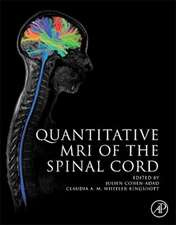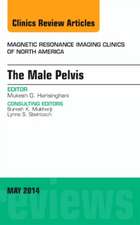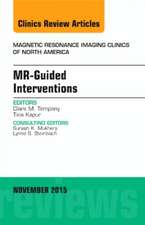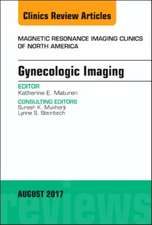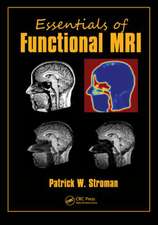Magnetic Resonance Imaging: The Basics
Autor Christakis Constantinidesen Limba Engleză Paperback – 12 mar 2014
The book begins with a general description of the phenomenon of magnetic resonance and a brief summary of Fourier transformations in two dimensions. It examines the fundamental principles of physics for nuclear magnetic resonance (NMR) signal formation and image construction and provides a detailed explanation of the mathematical formulation of MRI. Numerous image quantitative indices are discussed, including (among others) signal, noise, signal-to-noise, contrast, and resolution.
The second part of the book examines the hardware and electronics of an MRI scanner and the typical measurements and simulations of magnetic fields. It introduces NMR spectroscopy and spectral acquisition and imaging techniques employing various pulse sequences. The final section explores the advanced imaging technique of parallel imaging.
Structured so that each chapter builds on the knowledge gained in the previous one, the book is enriched by numerous worked examples and problem sets with selected solutions, giving readers a firm grasp of the foundations of MRI technology.
Preț: 403.05 lei
Preț vechi: 485.66 lei
-17% Nou
Puncte Express: 605
Preț estimativ în valută:
77.15€ • 83.83$ • 64.85£
77.15€ • 83.83$ • 64.85£
Carte tipărită la comandă
Livrare economică 21 aprilie-05 mai
Preluare comenzi: 021 569.72.76
Specificații
ISBN-13: 9781482217315
ISBN-10: 1482217317
Pagini: 240
Ilustrații: 105 black & white illustrations, 6 black & white tables
Dimensiuni: 178 x 254 x 18 mm
Greutate: 0.54 kg
Ediția:1
Editura: CRC Press
Colecția CRC Press
ISBN-10: 1482217317
Pagini: 240
Ilustrații: 105 black & white illustrations, 6 black & white tables
Dimensiuni: 178 x 254 x 18 mm
Greutate: 0.54 kg
Ediția:1
Editura: CRC Press
Colecția CRC Press
Public țintă
Professional ReferenceCuprins
Fourier Transformations. Fundamentals of Magnetic Resonance Imaging. Molecular Environment and Relaxation. Fundamentals of Magnetic Resonance II: Imaging. Fundamentals of Magnetic Resonance III: The Formalism of k-Space. Pulse Sequences. Instrumentation. Tour of an MRI Facility. Spectroscopy and Spectroscopic Imaging. Imaging Equation and Spectroscopic Imaging. Problem Sets. Multiple Choice Questions. Solutions to Selected Problems. Answers to Multiple Choice Questions. Glossary. Bibliography. Index.
Recenzii
"Overall this is excellent book and author has taken lot of time/effort to explain complex physiscs concepts. It will be of great use to all the radiology trainees who wish to learn more about MRI physiscs."
—Jagadish Malla, The Society of Radiologists in Training
—Jagadish Malla, The Society of Radiologists in Training
Notă biografică
Christakis Constantinides, PhD joined the faculty of the Mechanical Engineering Department at the University of Cyprus in September 2005. He has also acted as a consultant to his start-up firm, Chi-Biomedical Ltd. ever since. His specific research interest focuses on the study of cardiac mechanical function, computational and tissue structure modeling and characterization, hardware design, and functional and cellular tracking methods using MRI. The goal of his research efforts is the complete characterization of the electromechanical function of the heart in small animals and humans, aiming to promote the understanding of mechanisms of human disease that is predominantly underlined by genetic causes.
Descriere
Based on courses taught at The Johns Hopkins University, this text provides a solid introduction to MRI technology. After an overview of magnetic resonance and Fourier transformations, it examines the principles of physics for nuclear magnetic resonance (NMR) signal formation and image construction. It explains the mathematical formulation of MRI and discusses image quantitative indices. Additional topics include hardware and electronics of an MRI scanner, magnetic fields, and NMR spectroscopy and spectral acquisition and imaging techniques. The final section explores advanced imaging techniques. The book is enriched by numerous worked examples and problem sets with selected solutions.

